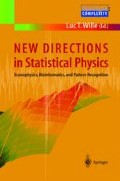Abstract
We report on our use of multi-agent games to understand financial market behavior. In addition to discussing the background to the multi-agent games themselves, we report a technique which may prove useful for forecasting future movements of financial time-series. A third-party game is trained on a black-box time-series, and is then run into the future to extract next-step and multi-step predictions. Such predictions have potential use as the basis for improved risk management and portfolio optimization strategies.
Access this chapter
Tax calculation will be finalised at checkout
Purchases are for personal use only
Preview
Unable to display preview. Download preview PDF.
References
P. Jefferies, M. Hart, P.M. Hui, N.F. Johnson: Eur. Phys. J. B 20, 493 (2001); N.F. Johnson, M. Hart, P.M. Hui, D. Zheng: Int. J. of Theor. and Appl. Fin. 3, 443 (2000)
Further details concerning the prediction method were presented elsewhere, see D. Lamper, S. Howison, N.F. Johnson: Phys. Rev. Lett. 88,017902 (2002), and are the subject of a patent application
T. Lux, M. Marchesi: Nature 397, 498 (1999)
D. Challet, Y.C. Zhang: Physica A 246,407 (1997). See also the Minority Game web-page at http://www.unifr ch/econophysics
D. Challet, Y.C. Zhang: Physica A 256, 514 (1998)
R. Savit, R. Manuca, R. Riolo: Phys. Rev. Lett. 82, 2203 (1999)
M. Hart, P. Jefferies, N.F. Johnson, P.M. Hui: Physica A 298, 537 (2001); N.F. Johnson, M. Hart, P.M. Hui: Physica A 269, 1 (1999); M. Hart, P. Jefferies, N.F. Johnson, P.M. Hui: Phys. Rev. E 63, 017102 (2000); M. Hart, P. Jefferies, P.M. Hui, N.F. Johnson: Eur. Phys. J. B 20, 547 (2000); N.F. Johnson, P.M. Hui, R. Jonson, T.S. Lo: Phys. Rev. Lett. 82, 3360 (1999)
P. Ormerod: ‘Surprised by depression’, Financial Times, February 19, 2001
J.P. Bouchaud, D. Sornette: J. de Phys. 14, 863 (1994). See also J.P. Bouchaud, M. Potters, Theory of Financial Risks ( Cambridge University Press, Cambridge 2000 )
Editor information
Editors and Affiliations
Rights and permissions
Copyright information
© 2004 Springer-Verlag Berlin Heidelberg
About this chapter
Cite this chapter
Johnson, N.F., Lamper, D., Jefferies, P., Hart, M.L. (2004). Toward an Understanding of Financial Markets using Multi-agent Games. In: Wille, L.T. (eds) New Directions in Statistical Physics. Springer, Berlin, Heidelberg. https://doi.org/10.1007/978-3-662-08968-2_7
Download citation
DOI: https://doi.org/10.1007/978-3-662-08968-2_7
Publisher Name: Springer, Berlin, Heidelberg
Print ISBN: 978-3-642-07739-5
Online ISBN: 978-3-662-08968-2
eBook Packages: Springer Book Archive

